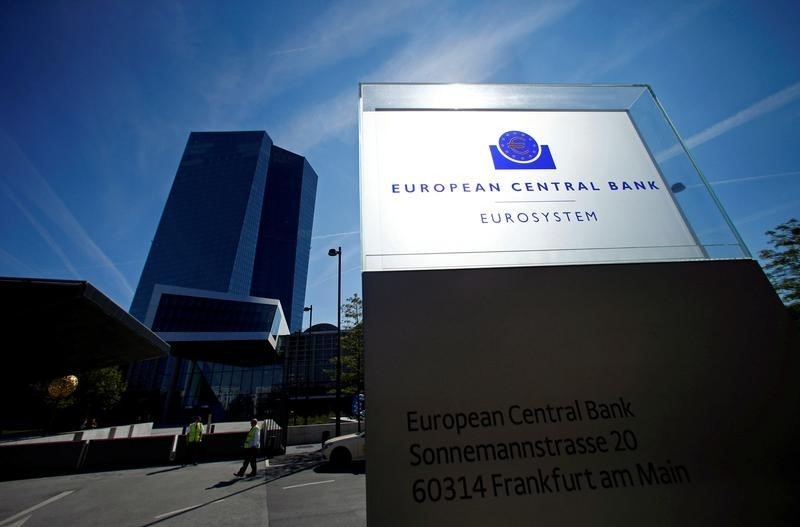By Francesco Canepa and Balazs Koranyi
FRANKFURT (Reuters) - Euro zone banks will get to set their own targets for cutting the 900 billion euros of bad loans left over from the financial crisis, facing sanctions only if they fall way short of the mark, new guidance by the European Central Bank showed on Monday.
Banks in weak economies such as Greece, Portugal and Italy are still struggling under the burden of unpaid loans extended before the crisis, which reduce their ability to lend and undermine investor confidence. To see a graphic: http://tmsnrt.rs/2clwaCX
The ECB, as the euro zone's top bank supervisor, is trying to get banks to manage down that mountain of soured credit. But it cannot push them too hard if it doesn't want them to incur hefty losses, which would also strangle lending.
Under new guidance disclosed on Monday, banks will be asked to set numerical targets for the levels of non-performing loans they aim to reach in one and three years, and follow a number of other guidelines.
Failure to comply may lead to so-called 'supervisory measures' by the ECB, such as higher capital requirements.
But the ECB said the new guidelines would be non-binding and only "significant" deviations from them may trigger action, while solving the problem would take longer than three years in many cases.
This confirms an earlier Reuters report and suggests the ECB is raising the pressure on banks, rather than forcing their hands, to avoid hitting their profits too hard, which would eat into their capital.
"Part of the engagement is the assessment of whether the banks are close to compliance with the guidance or whether they have very significant gap," said Sharon Donnery, the Irish deputy governor who chaired the ECB's working group on bad loans.
"If there were significant gaps, then obviously we would be discussing with the bank how they would move close toward compliance with the guidance, particularly the time frame over which that was going to happen."
As the euro zone's central bank, the ECB has been trying to revive economic growth and inflation by stimulating lending via ultra-low interest rates and aggressive money printing.
That leaves the ECB walking a thin line between its duties as supervisor and its main objective of bringing inflation, currently near zero, to almost two percent.
"Magic wands don’t exist in finance and it is not in the interest of financial stability to create a fire sale," said Marco Troiano, a director at Scope Ratings. "That would create a capital hole at banks."
NO FIRE SALE
When the ECB disclosed plans to work on new guidelines for non-performing loans in January, some banks worried that it would force a fire sale of those assets. That would push down their selling price and hurt bank profits.
However, the guidelines showed banks will be given three years or, in many cases, longer.
"We chose a three-year target because most banks have a three-year projection in their business plans ... for a number of banks, this will not be the end of the story, it will likely take longer," Donnery said.
That is likely to disappoint investors who were hoping for a clear-out that would remove the overhang of bad debt for good and allow them to buy those loans cheaply.
"This guidance gives banks a green light to manage NPLs internally, so this perpetuates the impasse," said Gennaro Pucci, chief investment officer at PVE Capital, a fund that has been buying Italian bad loans.
"If you leave banks with this huge pile of non-performing loans, they won’t lend. So it’s just kicking the can down the road."
Around 7 percent of all loans on the books of the 129 large banks supervised by the ECB were non-performing at the end of last year, meaning they hadn't been repaid for at least three months, the ECB said in its report.
That ratio rises to 12 percent in Italy, 15 percent in Portugal and 47 percent in Greece. Greek banks and Italy's Monte Paschi have already been handed ambitious targets for reducing their own bad debt.

The guidelines will now be subject to a public consultation, due to end on Nov. 15.
(Graphic by Gustavo Cabrera; editing by Larry King)
